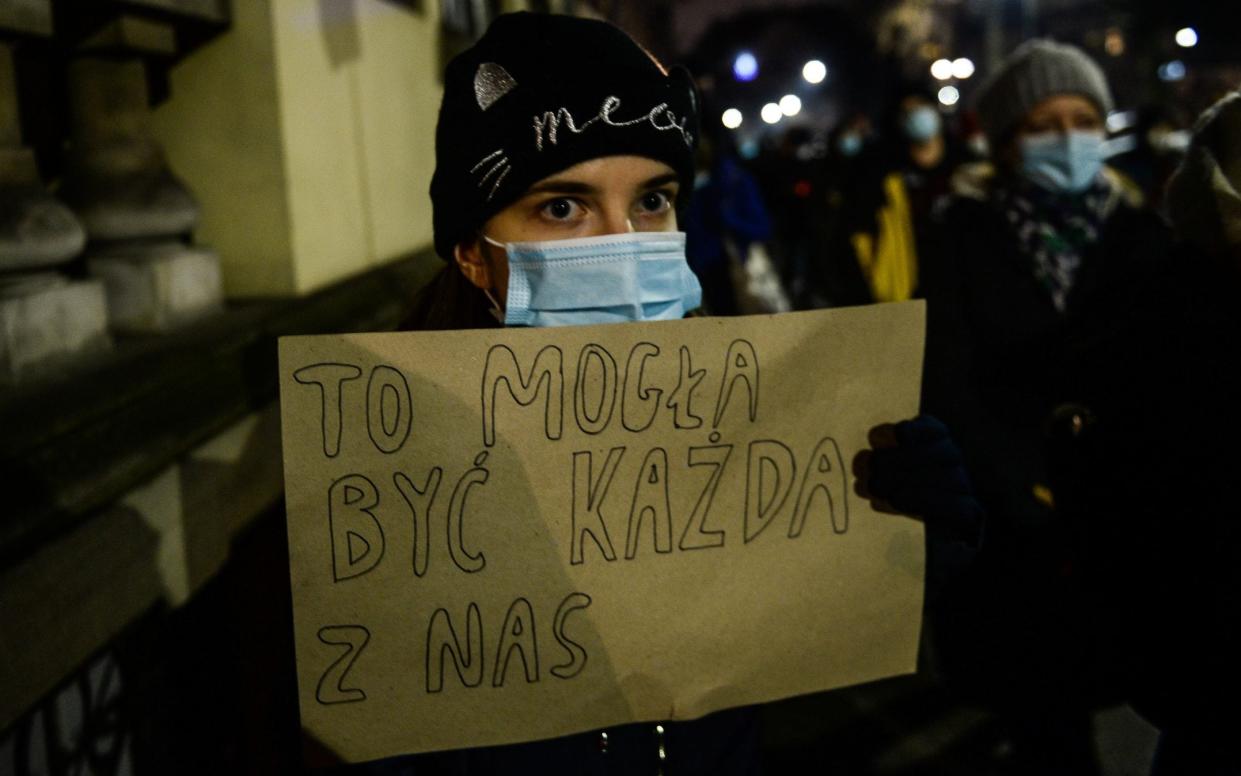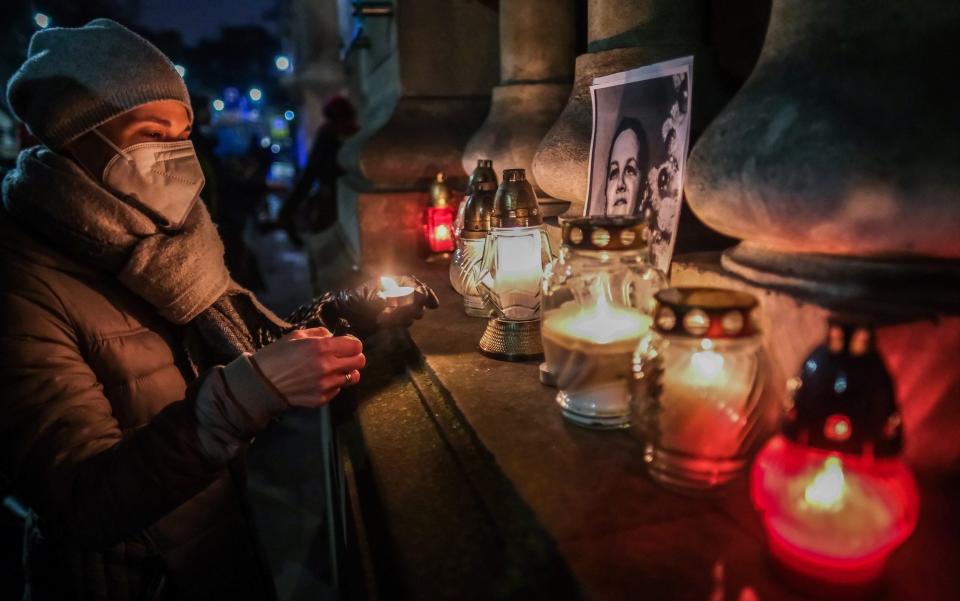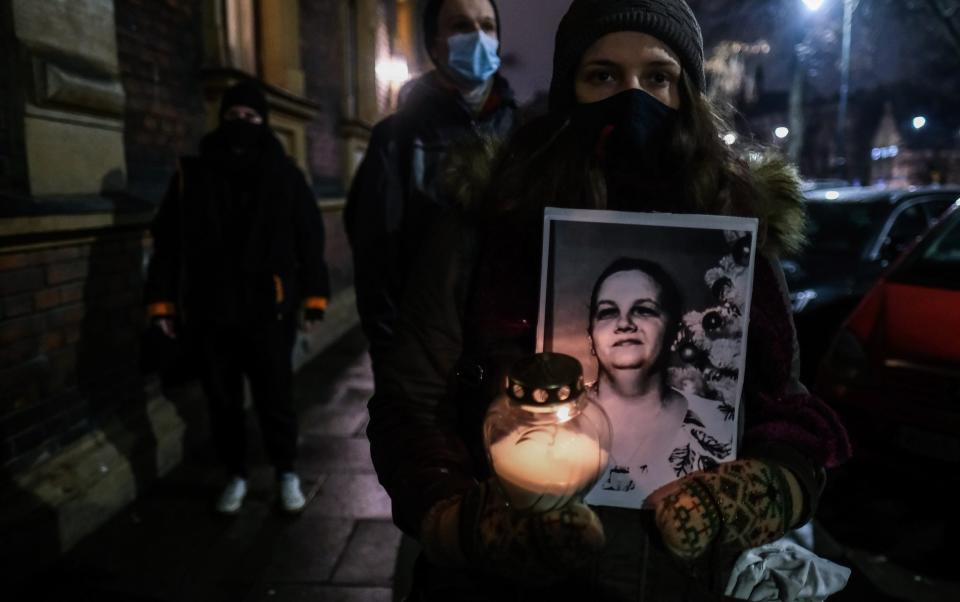Polish government accused of murder after death of woman who was denied abortion

Poland’s government is guilty of murder, campaigners said on Thursday following the death of a woman forced to carry a dead foetus in her womb for over a week because of draconian new abortion laws.
The 37-year-old woman, who was carrying twins and was in her first three months of pregnancy, lost one foetus in mid-December but was refused an abortion, according to her family, despite the threat to her health and life.
A few days later the other foetus died, and the woman, known only as Agnieszka, died not long after, apparently from sepsis, although the exact cause is yet to be determined
Women’s rights activists in Poland have blamed her death on Poland’s strict abortion laws, which were tightened last year, despite massive nationwide protests.
All abortions except in the case of incest, rape or when the woman’s health is threatened are now illegal - making the regulations some of the harshest in the world.
Opponents of the law argue it has forced doctors into adopting a ‘wait-and-see’ approach with dangerous pregnancies in case they face criminal prosecution for performing an abortion subsequently judged illegal.

“We took to the streets to protest against people being condemned to death. It can happen to any of us. This time it was Agnieszka who died,” said Marta Lempart, the leader of the Polish Women’s Strike Movement, the organisation behind the protests. “And I blame the ruling party for her death. They are the ones who condemned her to death in agony and pain. They are the ones who murdered her.”
In a furious statement the Strike Movement also accused the leaders of the government, dominated by the conservative Law and Justice party, of turning “maternity wards into torture chambers”.
“We would forcibly remove you from your offices and drag you into the streets,” the statement added. “If it were possible, we would have all of you put behind bars tonight. We would make you pay for what you had done.”
Supporters of the Polish government, which has strong ties to the Catholic Church and likes to portray itself as a defender of what it considers traditional values, have argued the tighter law protects foetuses with abnormalities from “eugenic abortions”.
The hospital where Agnieszka died has denied the abortion law influenced the decisions of medical staff, saying in a statement: “The doctor’s actions had not been influenced by anything else apart from medical reasons and the care for the patient and her children.”
‘Wait-and-see’ attitude
Despite this, prosecutors have launched an investigation into the death, and police have started seizing medical records.
“Unfortunately removing the dead foetus was not allowed because Polish law strictly forbids it,” the family said on Facebook.
“Yet another pregnant, innocent young woman, mother and wife, has died.”
The government is yet to comment on the case.
Campaigners say in practice it is almost impossible for those eligible for a legal abortion to obtain one.
Agnieszka is the second woman thought to have died as a result of the strict laws. Last year, thousands of Poles demonstrated after a 30-year-old woman called Izabela died of sepsis following the death of her foetus.
Her family called her the first victim of the termination ban, with doctors also taking a ‘wait-and-see’ attitude because of the new rules.
Krystyna Kapcura, director of Poland’s Federation for Women and Family Planning (Federa), said the organisation was looking into Agnieszka’s case to confirm the details.
She said since the news of Agnieszka’s death broke hundreds of women had contacted Federa asking for help. Women are scared of getting pregnant or those in the early stages are asking for the names of “friendly gynaecologists” who would be willing to perform terminations in the event of a medical emergency, she said.
“Last night we received hundreds of emails from women who are afraid of what will happen to them. Some of them have told us they will never get pregnant, others say they will go abroad to have their babies. This past year has been one of fear and tragic suffering,” she said.
Even before the death of Agnieszka, Federa said calls to its helpline had gone up three times over the past year.
Ms Kacpura said she believed resistance to the abortion law was growing.
“Yesterday we lit candles and demonstrated in silence in front of the Constitutional Tribunal [the body that passed the law] and the same happened in many other towns. Even if the procedure turns out to be correct [in the case of Agnieszka] there is now much fear and anger among women,” she said.

Adriana Lamackova, senior legal adviser at the Centre for Reproductive Rights, said the law had had “tragic consequences” for women and their families.
However, even before the ban Poland severely restricted abortions and only around 1,000 were performed every year compared to the 200,000 performed in England and Wales in 2020.
She said civil and women’s rights organisations, such as Federa, alongside Polish MPs are tabling a bill to overturn the ban amid the changing public mood.
Around 1,000 women have taken the Polish government to the European Court of Human Rights, arguing the law violates their rights to privacy and freedom from torture. The Court is expected to begin ruling on some of these cases soon.
Ms Lamackova said she hoped that any overturning of the law would go beyond what was previously in place, taking Poland in line with other European countries.
“The actions by Poland have been wholly out of step with trends across Europe, which is to ensure access to abortion rather than to restrict. Poland is the only country in recent history that has actually expanded its highly restrictive laws. So yes, we hope that women in Poland can access abortion when they need it, including on request,” she said.
Nine human rights organisations, including Amnesty International, Human Rights Watch and the Centre for Reproductive Rights, condemned the laws, saying they were contrary to international and European human rights standards and public health guidelines.
“They compromise women’s freedom, dignity, health, and lives,” they said in a statement.

 Yahoo News
Yahoo News 
